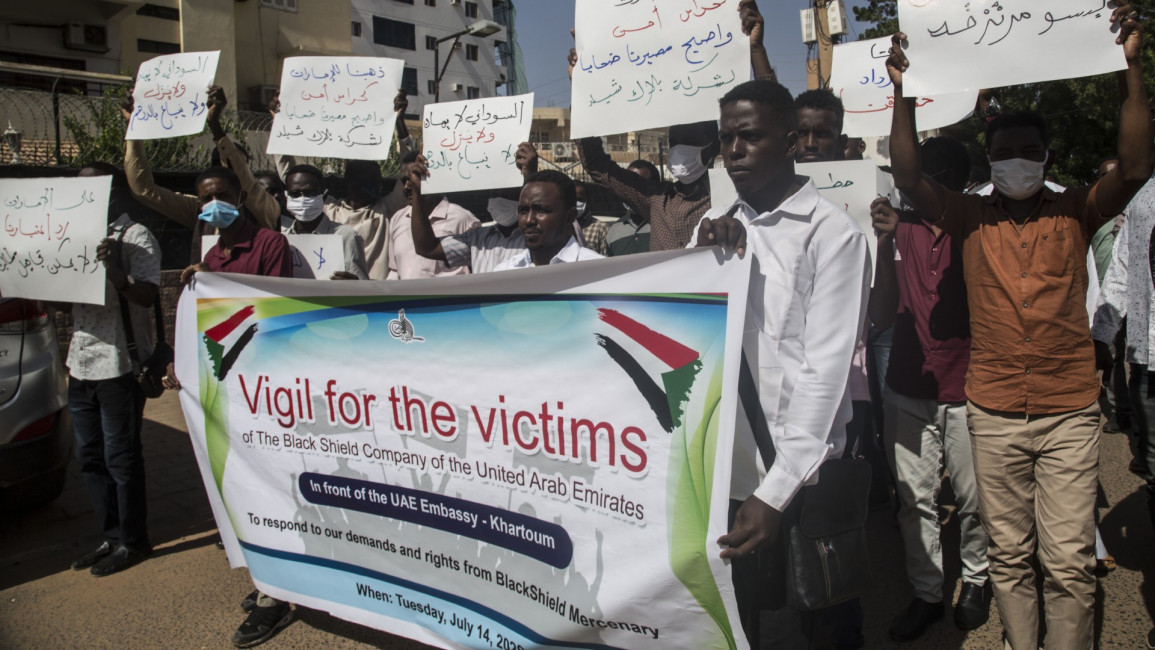Sudanese protesters demand UAE apology, compensation for mercenary recruitment in Libya
Sudanese protesters demand UAE apology, compensation for mercenary recruitment in Libya
Hundreds of Sudanese protested outside the UAE embassy in Khartoum, accusing Abu Dhabi of luring them into fighting alongside Khalifa Haftar's forces in Libya.
2 min read
Sudanese protesters demonstrate outside the UAE embassy in Khartoum [Getty]
Hundreds of Sudanese people gathered outside of the UAE embassy in capital Khartoum on Tuesday to demand an apology and compensation for their recruitment to fight for rogue Libyan general Khalifa Haftar's forces, Anadolu Agency reported.
The protesters said they were deceived by the Emirati company Black Shield Security Services, which allegedly lured them into fighting for Haftar under pretenses of offering employment.
"We demand an apology from the UAE to the Sudanese people because we are not mercenaries," a protester told Anadolu Agency.
Another said they would raise the issue with the United Nations and human rights groups if the embassy failed to respond to their demands.
In January, Sudan launched an investigation into reports that Sudanese men were being hired as security guards for Black Shield and then dispatched to fight as mercenaries in Libya and Yemen.
The foreign ministry said it was looking into the case after some families of the men staged a sit-in outside the ministry building and UAE embassy in Khartoum that month.
Black Shield's alleged activities were first brought to light in January, after a Sudanese man told Al Jazeera that his brother travelled to the UAE after responding to a job advertisement for security guards in the country in October last year.
Upon his arrival in the country, however, the man's brother was allegedly sent to a military training camp alongside around 150 others.
Black Shield has previously denied the claims.
Sudanese mercenaries and UAE influence are part of a wider network of foreign involvement in Libya's conflict.
Last month, UN Secretary-General Antonio Guterres warned that foreign interference in Libya has reached "unprecedented levels", noting the delivery of sophisticated equipment and the number of mercenaries involved in the fighting.
Follow us on Facebook, Twitter and Instagram to stay connected
The protesters said they were deceived by the Emirati company Black Shield Security Services, which allegedly lured them into fighting for Haftar under pretenses of offering employment.
"We demand an apology from the UAE to the Sudanese people because we are not mercenaries," a protester told Anadolu Agency.
Another said they would raise the issue with the United Nations and human rights groups if the embassy failed to respond to their demands.
In January, Sudan launched an investigation into reports that Sudanese men were being hired as security guards for Black Shield and then dispatched to fight as mercenaries in Libya and Yemen.
The foreign ministry said it was looking into the case after some families of the men staged a sit-in outside the ministry building and UAE embassy in Khartoum that month.
Black Shield's alleged activities were first brought to light in January, after a Sudanese man told Al Jazeera that his brother travelled to the UAE after responding to a job advertisement for security guards in the country in October last year.
Upon his arrival in the country, however, the man's brother was allegedly sent to a military training camp alongside around 150 others.
Black Shield has previously denied the claims.
Last month, Sudan said it had arrested 122 of its nationals, including eight children, as they headed to Libya to fight as mercenaries.
A confidential UN report unveiled in October last year alleged the presence of a thousand Sudanese militiamen in the eastern Libyan city of Benghazi.
Sudan's Janjaweed militia - an infamous key player in the Darfur conflict - has reportedly been identified as operating alongside Haftar in Libya.
Haftar's forces are known to include a number of foreign mercenaries, including suspected members of Russia's Wagner Group.
In addition to reports stating it funnelled mercenaries into Libya, Abu Dhabi has also been accused of breaking a United Nations arms embargo on Libya to support Haftar's forces.
This month, Libya's National Oil Corporation has accused the UAE of instructing forces loyal to Haftar to impose a blockade of oil exports from the country.Sudanese mercenaries and UAE influence are part of a wider network of foreign involvement in Libya's conflict.
Last month, UN Secretary-General Antonio Guterres warned that foreign interference in Libya has reached "unprecedented levels", noting the delivery of sophisticated equipment and the number of mercenaries involved in the fighting.
Follow us on Facebook, Twitter and Instagram to stay connected


![President Pezeshkian has denounced Israel's attacks on Lebanon [Getty]](/sites/default/files/styles/image_684x385/public/2173482924.jpeg?h=a5f2f23a&itok=q3evVtko)



 Follow the Middle East's top stories in English at The New Arab on Google News
Follow the Middle East's top stories in English at The New Arab on Google News


